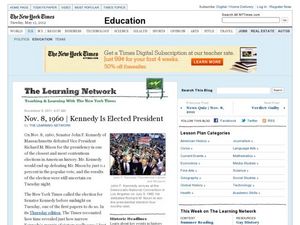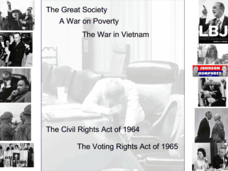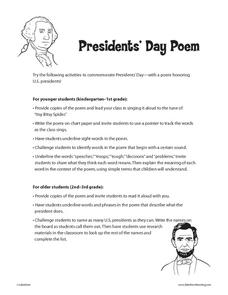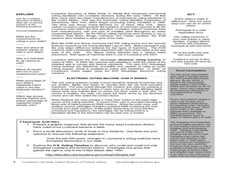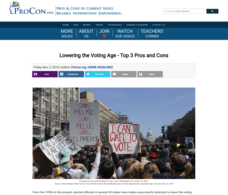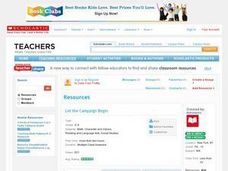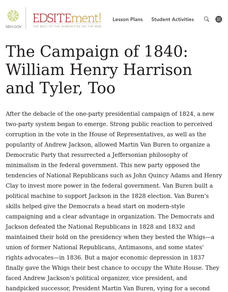National Endowment for the Humanities
The 1828 Campaign of Andrew Jackson: Changes in Voting Participation
Students give examples to indicate how voting participation changed in the first half of the 19th century, and make connections between changes in voting participation and the results of the election of 1828.
Curated OER
Nov. 8, 1960 | Kennedy Is Elected President
Using the presidential election of 1960 as background information, learners consider the push of electoral reform. They read about the events and issues surrounding President Kennedy's win in 1960 and compare them to the same issues...
National Endowment for the Humanities
The 1828 Campaign of Andrew Jackson: Expansion of the Voting Base
Students give examples to indicate how the franchise was extended and limited in the first half of the 19th century, and cite some differences in the newly enfranchised population that could affect the way they would vote.
Heritage Foundation
Voting and the Constitution
How difficult was it for everyone to get voting rights? Understanding voting rights and the fight to get them for everyone in the United States can be tricky for some learners. However, they are clarified after engaging in the...
Curated OER
President LBJ
Here's a quick look at the Johnson presidency. Each of his major acts are discussed with images and video web links. The Voting Rights Act, Tet Offensive, Civil Rights Act, and War on Poverty are defined.
Student Handouts
Voting Rights Speech Before Congress
Is your class studying civil rights? Consider taking a look at President Lyndon B. Johnson's voting rights speech. This resource includes an abridged version and three related questions. Pupils consider Johnson's use of language and the...
Classroom Law Project
What does the Constitution say about voting? Constitutional Amendments and the Electoral College
As part of a study of voting rights in the US, class members examine Constitutional amendments connected with voting and the role of the Electoral College in the election process.
DocsTeach
The Path of Justice: Selma and the Voting Rights Act
The civil rights movement: An ongoing battle for change. The activity focuses on President Johnson's speech in response to the massacre at the Selma March. Academics study the speech, complete a hands-on-activity, and discuss President...
Carolina K-12
Get Out the Vote!
What better way to have a class learn about get out the vote campaigns than by having them create one themselves? After introducing get out the vote efforts and why they exist through videos, articles, and discussion questions, the...
Encyclopedia Britannica
Becoming US President
It's that time of year, and the year. Once again the race is on for the White House. It's important that young voters, and would-be voters, understand the process for becoming the United States President. Class members research the...
Lakeshore Learning
Presidents' Day Poem
What a great way to combine English language arts with your celebration of Presidents' Day! Youngsters are guided through the reading of a poem sung to the tune of "Itsy Bitsy Spider" on the jobs of the president of the United States,...
Curated OER
How We Vote
Students fill in a graphic organizer and discuss the struggles in groups about the history of voting in Louisiana. Students also explore a voting timeline to see who could and could not vote before and after 1850.
K20 LEARN
LBJ and Voting Rights
Challenges to voting rights is not a new thing. Using President Lyndon B. Johnson's 1965 "The American Promise" speech on voting rights as a starting point, young historians research current voting rights laws and challenges.
Humanities Texas
A President's Vision: Abraham Lincoln
Invite your learners to take a close look at Abraham Lincoln's presidency through analysis worksheets of several images and primary documents, presented on an educational poster entirely dedicated to this great United States president.
ProCon
Voting Age
Should age matter when it comes to voting? Scholars read an article discussing the pros and cons of lowering the voting age to 16. They then consider both the advantages and disadvantages of having younger voters. After thinking about...
Curated OER
Texas Kid Writes Book About Presidents
Arranged into small groups, learners read a paragraph of the news story "Texas Kid Writes Book About Presidents." As one reads, others mark the text (underlining important information and writing notes in the margin of the story). After...
Curated OER
If I Were President
Children discuss voting and the presidency. They make a picture of what they would do as president and dictate a caption. The class then votes on the snack they would like to eat that day. This presents many wonderful learning...
ProCon
President Ronald Reagan
At 69 years old, Ronald Reagan was the oldest man ever to be elected president in the United States. After reviewing a thorough history of Reagan's presidency, pupils read the main pro and con arguments to determine if he was a good...
K20 LEARN
Electoral College: Does My Vote Count?
How can a candidate get the most votes, yet still lose the race for the presidency? This is has happened more than once in American history, including in the elections of 2000 and 2016. Using an activity for creating group notes, young...
Curated OER
Let the Campaign Begin
Students examine the many steps involved in the electoral process. They examine past president's campaigns and write an announcement speech for the candidate of their choice.
Curated OER
The Campaign of 1840: William Henry Harrison and Tyler, Too
Students list some issues important during the campaign of 1840. They compare and contrast the careers of Martin Van Buren and William Henry Harrison before they became president and explain why the Whigs wanted to find a candidate in...
Curated OER
May The Best Character Win
Students examine the financial committment to running a campaign. They discuss the difference between electroal and popular votes. They realize how involved a political campaign is!
C-SPAN
Electoral College Pros/Cons and Alternatives
If every vote counts, why do we need the electoral college? Middle and high schoolers study the Constitutional precedent of the electoral college, as well as its place in historical and modern elections, with an engaging social studies...
Curated OER
U.S. Constitution - Selecting the President
Young scholars study how the electoral college works to select a U.S. President. In this history lesson, students examine the U.S. Elector College methods then answer questions and write an essay that relate to the state where they live.



